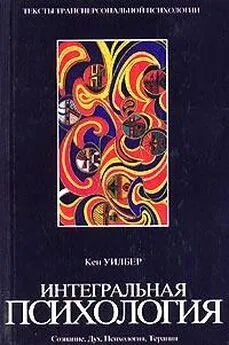Кен Уилбер - Око духа. Интегральное видение для слегка сдвинувшегося мира
- Название:Око духа. Интегральное видение для слегка сдвинувшегося мира
- Автор:
- Жанр:
- Издательство:неизвестно
- Год:неизвестен
- ISBN:нет данных
- Рейтинг:
- Избранное:Добавить в избранное
-
Отзывы:
-
Ваша оценка:
Кен Уилбер - Око духа. Интегральное видение для слегка сдвинувшегося мира краткое содержание
Око духа. Интегральное видение для слегка сдвинувшегося мира - читать онлайн бесплатно ознакомительный отрывок
Интервал:
Закладка:
Richards, F. and M. Commons. 1990. Postformal cognitive-developmental theory and research. In Alexander et al., 1990, 139–61.
Ricoeur, P. 1981. Hermeneutics and the human sciences . Cambridge: Cambridge Univ. Press.
Ricoeur, P. 1992 . Oneself as another . Chicago: Univ. of Chicago Press.
Ricoeur, P. 1995 . The philosophy of Paul Ricoeur . Ed. by L. Hahn. Chicago: Open Court.
Riso, D. 1987. Personality types . Boston: Houghton Mifflin.
Riso, D. 1990. Understanding the enneagram . Boston: Houghton Mifflin.
Robinson, L. 1986. Sex, class, and culture . New York: Methuen.
Rorty, R. 1979. Philosophy and the mirror of nature . Princeton: Princeton Univ. Press.
Rorty, R. 1982. Consequences of pragmatism . Minneapolis: Univ. of Minnesota Press.
Rothberg, D. 1986a. Philosophical foundations of transpersonal psychology. Journal of Transpersonal Psychology , 18: 1–34.
Rothberg, D. 1986b. Rationality and religion in Habermas* recent work. Philosophy and Social Criticism. 11: 221–43.
Rothberg, D. 1990. Contemporary epistemology and the study of mysticism. In R. Forman,ed. 1990.
Rothberg, D. 1992. Buddhist nonviolence. Journal of Humanistic Psychology 32(4): 41–75.
Rothberg, D. 1993. The crisis of modernity and the emergence of socially engaged spirituality. ReVision 15(3): 105–15.
Russell, B. 1945. A history of western philosophy . New York: Clarion.
Saussure, F. 1966 (1915). Course in general linguistics . New York: McGraw-Hill.
Schapiro, M. 1994. Theory and philosophy of art: Style, artist, and society . New York: Braziller.
Schelling, F. 1978 (1800). System of transcendental idealism . Trans, by P. Heath. Charlottesville: Univ. Press of Virginia.
Schopenhauer, A. 1969. The world as will and representation . 2 vols. New York: Dover.
Schwartz, T. 1995. What really matters: Searching for wisdom in America . New York: Bantam.
Scott, A. 1995. Stairway to the mind . New York: Copernicus.
Scotton, В.; A. Chinen; and J. Battista, eds. 1996. Textbook of transpersonal psychiatry and psychology . New York: Basic Books.
Searle, J. 1992 (1969). Speech acts . Cambridge: Cambridge Univ. Press.
Searle, J. 1995. The construction of social reality . New York: Free Press.
Shapiro, D., and R. Walsh, eds. 1984. Meditation: Classic and contemporary perspectives . New York; Aldine.
Sheldrake, R. 1989. The presence of the past: Morphic resonance and the habits of nature . New York: Viking.
Sheldrake, R. 1990. The rebirth of nature . London: Century.
Showalter, E. 1985. The new feminist criticism . New York: Pantheon.
Siegler, R. 1991. Children's thinking . Englewood Cliffs, N.J.: Prentice-Hall.
Sinnott, J. 1984. Post-formal reasoning. In Commons et al. (eds.), 1984.
Sinnott, J, ed. 1994. Interdisciplinary handbook of adult lifespan learning . Greenwich, Conn.: Greenwood Press.
Sinnott, J. and J. Cavanaugh, eds. 1991. Bridging paradigms: Positive development in adulthood and cognitive aging . New York: Praeger.
Smith, H. 1976 . Forgotten truth . New York: Harper.
Souvaine, E.; L. Lahey; and R. Kegan. 1990. Life after formal operations. In Alexander et al., 1990: 229–57.
Steinberg, R. (Ed.) 1990. Wisdom: Its nature, origins, and development . New York: Cambridge Univ. Press.
Strelka, J., ed. 1976. Literary criticism and psychology . University Park: Penn. State Univ. Press.
Suleiman, S., and I. Crosman, eds. 1980. The reader in the text . Princeton, N.J. Princeton Univ. Press.
Tannahill, R. 1992. Sex in history . Scarborough House.
Tannen, D. 1990. You just don't understand . New York: Morrow.
Tart, C, ed. 1992. Transpersonal psychologies . New York: HarperCollins.
Taylor, C. 1985. Philosophy and the human sciences—philosophical papers 2 . Cambridge: Cambridge Univ. Press.
Thomas, L.; S. Brewer; P. Kraus; and B. Rosen. Two patterns of transcendence: An empirical examination of Wilber's and Washburn's theories. Journal of Humanistic Psychology 33(3); 66–82.
TompkinsJ., ed, 1980. Reader-response criticism . Baltimore: Johns Hopkins.
Trungpa, C. 1988. Shambhala: The sacred path of the warrior . Boston: Shambhala.
Vaillant, G. 1993. The wisdom of the ego . Cambridge: Harvard Univ. Press.
Varela, F. 1979. Principles of biological autonomy . New York: North Holland.
Varela, F.; E. Thompson; and E. Rosch. 1993. The embodied mind . Cambridge:MIT Press.
Wade, J. 1996. Changes of mind . New York: SUNY Press. Wallace, R. 1970. Physiological effects of Transcendental Meditation. Science, 167 , 1751–54.
Walsh, R. 1989. Can Western philosophers understand Asian philosophies? Crosscurrents 34: 281–99.
Walsh, R. 1990. The spirit of shamanism . Los Angeles: Tarcher.
Walsh, R. 1995. The spirit of evolution: A review of Ken Wilber's Sex, ecology, spirituality. Noetics Sciences Review , Summer 1995.
Walsh, R., and F. Vaughan, eds. 1993. Paths beyond ego . Los Angeles: Tarcher.
Washburn, M. 1995. The ego and the dynamic ground . 2nd ed. rev. Albany: SUNY Press.
Whitehead, A. 1967 . Science and the modern world . New York: Macmillan.
Wilber, K. 1974. The spectrum of consciousness. Main Currents in Modern Thought , November/December 1974.
Wilber, K. 1978a. Spectrum psychology, part 1. ReVision 1(1): 5–29.
Wilber, K. 1978b. Spectrum psychology, part 2. ReVision 1(2): 5–33.
Wilber, K. 1978c. Microgeny. ReVision 1(3/4): 52–84.
Wilber, K. 1979a. Spectrum psychology, part 4. ReVision 2(1): 65–73.
Wilber, K. 1979b. Are the chakras real? In J. White, ed., Kundalini, evolution and enlightenment . Garden City, N.Y.: Doubleday Anchor, 1979.
Wilber, K. 1979c. A developmental view of consciousness. Journal of Transpersonal Psychology 11(1).
Wilber, K. 1980. The pre/trans fallacy. ReVision 3(2). Reprinted in K. Wilber, 1996c.
Wilber, K. 1981a. Ontogenetic development: Two fundamental patterns. Journal of Transpersonal Psychology 13(1): 33–58.
Wilber, K. 1981b. No boundary . Boston: Shambhala.
Wilber, K. 1982a. Odyssey. Journal of Humanistic Psychology 22(l):57–90.
Wilber, K. 1982b. The holographic paradigm . Boston: Shambhala.
Wilber, K. 1983. A sociable God: A brief introduction to a transcendental sociology , Boston: Shambhala.
Wilber, K. 1984. The developmental spectrum and psychopathology: Part 1, stages and types of pathology, Journal of Transpersonal Psychology 16(1): 75–118. Part 2, treatment modalities, Journal of Transpersonal Psychology 16(2): 137–166.
Wilber, K. 1990. Two patterns of transcendence: A reply to Washburn. Journal of Humanistic Psychology 30(3): 113–136.
Wilber, K. 1993 (1977). The spectrum of consciousness . Wheaton, 111.: Quest.
Wilber, K. 1995. Sex, ecology, spirituality: The spirit of evolution . Boston: Shambhala.
Wilber, K. 1996a (1980). The Atman project . 2nd ed. Wheaton, 111.: Quest.
Wilber, K. 1996b (1981). Up from Eden . 2nd ed. Wheaton, 111.: Quest.
Wilber, K. 1996c (1983 ). Eye to eye: The quest for the new paradigm . 3rd ed. Boston: Shambhala.
Wilber, K. 1996d. A brief history of everything . Boston: Shambhala.
Wilber, K.; J. Engler; and D. Brown. 1986. Transformations of consciousness : Conventional and contemplative perspectives on development . Boston: Shambhala.
Wimsatt, W. K., and M. Beardsley, The intentional fallacy, in W. K. Wimsatt, The verbal icon . New York: Noonday Press, 1966.
Wittgenstein, L. 1961 (1921). Tractatus logico-philosophicus . London: Routledge.
Wittgenstein, L. 1965. Philosophical investigations . New York: Macmillan.
Zimmerman, M. 1990. Heidegger's confrontation with modernity . Bloomington: Indiana Univ. Press.
Zimmerman, M. 1981. Eclipse of the self . Athens: Ohio Univ. Press.
Zimmerman, M. 1994. Contesting earth's future . Berkeley: Univ. of California Press.
ПРИМЕЧАНИЯ
Примечания
1
Введение
1См. К. Wilber, Quantum Questions: Mystical Writings of the World's Great Physicists (Boston: Shambhala Publications, 1985).
2
Коннективизм, коннекционизм — концепция (в равной степени относящаяся к кибернетике и к наукам о мозге), согласно которой все психические процессы объясняются уникальным распределением и относительной устойчивостью связей, образующихся между нервными клетками в мозгу и формирующих так называемые нервные (или нейронные ) сети ; в свою очередь, в этих сетях могут возникать более или менее устойчивые проводящие пути . Считается, что каждому психическому событию соответствует прохождение сигналов по определенному проводящему пути. Большинство попыток создания искусственного интеллекта основаны именно на моделировании таких сетей. ( Прим. ред. )
3
*Своеобразная игра слов: в этой фразе пропущено слово «данных», а подразумевает она, что если данные не представлены в определенной форме (не переведены на машинный язык), то компьютер не может их обрабатывать. Точно так же под «представлениями эмпирического мира» подразумевается информация, поступающая через органы чувств и переводимая на язык нервных импульсов, но, в то же время, представления — это образы мира, возникающие у нас в сознании, картины, представленные нашему сознательному «Я» как внутреннему наблюдателю. ( Прим. ред. )
4
Эта фраза нуждается в пояснении. Центральная тема в спорах о сознании — это «Обладает ли сознание причинной активностью?»; иначе говоря, может ли сознательно-волевой (то есть субъективный) акг сам по себе служить причиной чего бы то ни было объективного? Когда человек, например, сгибает палец, он не задумывается о том, что должен существовать какой то механизм, который превращает его субъективное и нематериальное желание в объективные и материальные нервные импульсы, заставляющие мышцы сокращаться. ( Прим. ред. )
Читать дальшеИнтервал:
Закладка:










